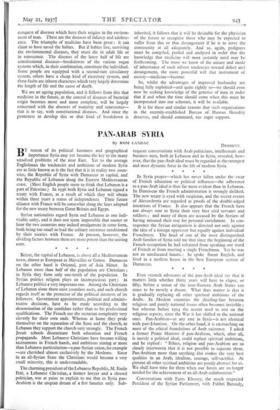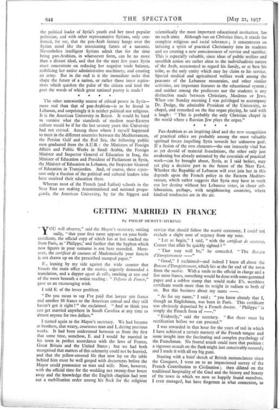PAN-ARAB SYRIA
Syrian nationalists regard Syria and Lebanon as one indi- visible unity, and it does not seem impossible that sooner or later the two countries may indeed amalgamate in some form, both being-too small to lead the solitary existence conditioned by their treaties with France. At present, however, the dividing factors between them are more potent than the uniting ones.
* * * * Beirut, the capital of Lebanon, is above all a Mediterranean town, almost as European as Marseilles or Genoa. Damascus on the other hand is Oriental, part of Asia Minor. In Lebanon more than half of the population are Christians ; in Syria they form only one-tenth of the population. In Syrian politics religion plays an inconspicuous part ; in Lebanese politics a very important one. Among the Christians of Lebanon alone there exist countless sects, and each church regards itself as the protector of the political interests of its followers. Government appointments, political and adminis- trative decisions, have to be made according to the denomination of the candidate rather than to his professional qualifications. The French use the sectarian complexity very cleverly for their own ends. Whereas at home they pride themselves on the separation of the State and the church, in Lebanon they support the church very strongly. The French Jesuit schools disseminate both education and French propaganda. Most Lebanese Christians have become willing instruments in French hands, and ambitions aiming at more than Lebanese particularism—a pan-Syrian union, for example —are cherished almost exclusively by the Moslems. Since in an all-Syrian State the Christians would become a very small minority, this is understandable.
The charming president of the Lebanese Republic, M. Emile Ette, a Lebanese Christian, a former lawyer and a shrewd politician, was at pains to explain to me that in Syria pan- Arabism is the utopian dream of a few fanatics only. Sub- sequent conversations with Arab politicians, intellectuals and business men, both in Lebanon and in Syria, revealed, how- ever, that the pan-Arab ideal must be regarded as the strongest and most dynamic force in the life of modern Syria.
* * * * In Syria proper—which has never fallen under the sway of French education or political influence—the adherence to a pan-Arab ideal is thus far more evident than in Lebanon. In Damascus the French administration is strongly disliked. The new treaty is eyed with suspicion, and the recent events of Alexandretta are regarded as proofs of the double-edged intentions of France. It also appears that the French have • not always sent to Syria their very best civil servants and soldiers ; and many of them are accused by the Syrians of having misused their stay for personal enrichment. In con- sequence the Syrian antagonism is directed not only against the idea of a foreign oppressor but equally against individual Frenchmen. The head of one of the most distinguished Arab families of Syria told me that since the beginning of the French occupation he had refrained from speaking one word of French or from meeting a single Frenchman. Yet he was not an uneducated fanatic : he spoke fluent English, and lived in a modern house in the best European section of Damascus.
* * * * Even staunch advocates of the pan-Arab ideal say that it matters little whether thirty years will have to elapse, or fifty, before a union of the near-Eastern Arab States can cease to be merely a dream. What does matter is that it is gradually replacing all other spiritual ambitions of the Arabs. In Moslem countries the dividing-line between religious and purely national issues often becomes invisible ; but whereas before 1914 the accent used to rest on the religious aspects, since the War it has shifted to the national ones. Pan-Arabism—at any rate in Syria—is not identical with pan-Islamism. On the other hand, it is encroaching on most of the ethical foundations of Arab existence. I asked a former Prime Minister if pan-Arabism, which, after all, is merely a political ideal, could replace spiritual ambitions, and he replied : " Ethics, religion and pan-Arabism are so closely interwoven that it is not possible to separate them. Pan-Arabism more than anything else evokes the very best qualities in an Arab, idealism, courage, self-sacrifice. At present all other spiritual ambitions are purely abstract for us. We shall have time for them when our forces arc no longer needed for the achievement of an all-Arab collaboration."
Conversations with Fares Khoury, the much respected President of the Syrian Parliament, with Fakhri Baroudy, the political leader of Syria's youth and her most popular politician, and with other representative Syrians, only con- firmed, for me, that the pan-Arab fantasy hangs over the Syrian mind like the intoxicating fumes of a narcotic. Nevertheless intelligent Syrians admit that for the time being pan-Arabism, in whatsoever form, can be no more than a distant ideal, and that for the next few years Syria must concentrate on reducing her negative trade balance, stabilising her native administrative machinery, and creating an army. But in the end is it the immediate tasks that shape the future of a nation, or rather those inner aspira- tions which quicken the pulse of the citizen and lend the poet the words of which great national poetry is made ?
* * * * The other noteworthy source of ethical power in Syria— more real than that of pan-Arabism—is to be found in Lebanon, and surprisingly it is neither political nor religious, It is the American University in Beirut. It would be hard to surmise what the standards of modern near-Eastern culture would be if for the last seventy years this University had not existed. Among those whom I myself happened to meet in the different countries between the Mediterranean, the Persian Gulf and the Red Sea, the following public men graduated from the A.U.B. : the Ministers of Foreign Affairs and Public Works in Saudi Arabia, the Foreign Minister and Inspector General of Education in Iraq, the Minister of Education and President of Parliament in Syria, the Minister of Education in Lebanon, the Inspector General of Education in Transjordan. And, of course, these repre- sent only a fraction of the political and cultural leaders who have received their education there.
Whereas most of the French (and Italian) schools in the Near East are making denominational and national propa- ganda, the American University, by far the biggest and scientifically the most important educational institution, has no such aims. Although run on Christian lines, it stands for complete religious and racial tolerance ; it concentrates on infusing a spirit of practical Christianity into its students and on creating a new consciousness of service and sacrifice. This is especially valuable, since ideas of public welfare and unselfish action are rather alien to the individualistic nature of the Arab, accustomed to regard his family, or at best his tribe, as the only entity which may lay claim to his service. Special medical and agricultural welfare work among the peasants of the Lebanese mountains, and other similar activities, are important features in the educational system.; and neither among the professors nor the students is any distinction made between Christians, Moslems or Jews. When one Sunday morning I was privileged to accompany Dr. Dodge, the admirable President of the University, to chapel, and remarked on the fine organ playing, he said with a laugh : " This is probably the only Christian chapel in the world where a Russian Jew plays the organ."
* * * * Pan-Arabism as an inspiring ideal and the new recognition of practical ethics are probably among the most valuable spiritual forces impelling Syria towards her unknown goal. If a fusion of the two elements—the one intensely vital but as yet devoid of material foundations, the other only just awakening but already animated by the essentials of practical work—can be brought about, Syria, as I said before, may yet play a decisive part in the future of the Near East. Whether the Republic of Lebanon will ever join her in this depends upon the French policy in the Eastern Mediter- ranean, which rather suggests that Syria may have to work out her destiny without her Lebanese sister, in closer col- laboration, perhaps, with neighbouring countries, where kindred tendencies are in the air.















































 Previous page
Previous page